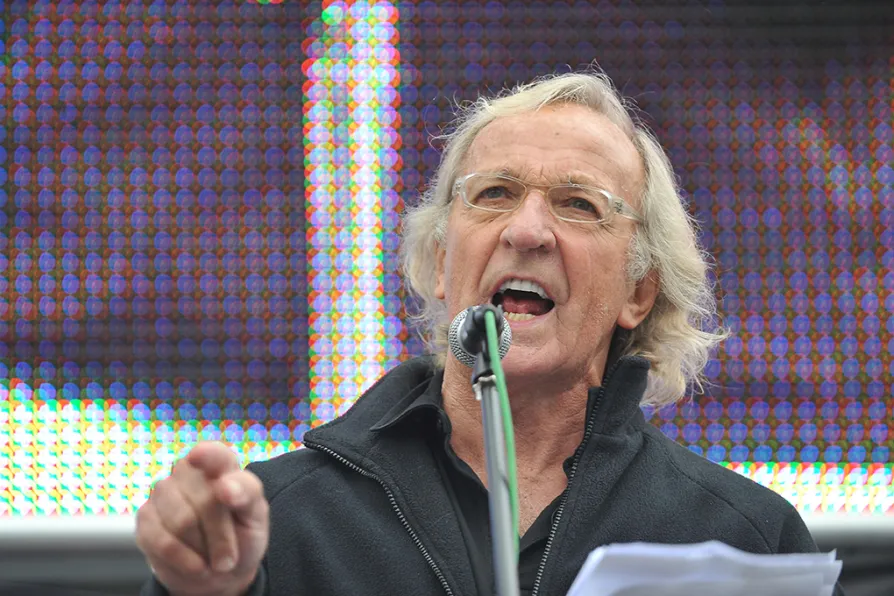
 John Pilger, pictured in 2011, addressing an anti-war demonstration marking the 10th anniversary of the Afghanistan war, in Trafalgar Square, London
John Pilger, pictured in 2011, addressing an anti-war demonstration marking the 10th anniversary of the Afghanistan war, in Trafalgar Square, London
THE death of John Pilger leaves a void. There are few investigative journalists of his courage or integrity.
And designedly so. From the censorship of “hostile” voices across the internet to the outrageous incarceration of Julian Assange, every effort is being made to stamp out independent journalism.
Anything that leads us to question the narratives of the powerful, the just cause of the US-led “free world” and the criminal character of its enemies, is silenced or mocked.
We do not have a media watchdog that holds power to account, though this is the myth of the free press we teach politics students at school. Instead the mass media operates as an attack dog, identifying and savaging enemies selected by our rulers.
It’s getting worse, and Pilger knew it. In a message to the Morning Star’s For a Workers’ Fightback and a Workers’ Media conference last March, he called for “urgent debate and activism around the issue of the media… the media was rarely a friend of working people, but there were spaces for independent journalists in the mainstream.
“My own career is testament to that. Until a few years ago I worked in mainstream newspapers — in later years the Guardian mainly — but the Guardian like the others is now closed to independent thinking and honest journalism… we need to understand that the media is now fully integrated into an extremist state, and that working people must look elsewhere — to the Morning Star, yes, and to oases on the internet where good journalism flourishes.”
Pilger was not alone in this analysis. Another longstanding analyst of Western media, Noam Chomsky, noted that since Russia’s invasion of Ukraine “censorship in the United States has reached a level beyond anything in my lifetime.”
The dream that the internet would break the domination of established newspapers has evaporated. The big online platforms use their market power politically, whether that is Twitter (now X) enabling and suppressing accounts to mislead the world about the coup against Evo Morales in Bolivia, or Meta (which owns Facebook) engaging, according to Human Rights Watch, in a global censorship of Palestinian voices.
Many on the left were upset, during the Corbyn years, that Britain’s press proved so unfair and dishonest. Such reactions were understandable but we must now internalise the lesson, as Pilger warned.
The Establishment media are not our friends and, for all the hue and cry over “fake news,” they are often the biggest purveyors of fake news on the planet.
They are capable of astonishing self-censorship, as we have seen with coverage of the explosions that wrecked Russia’s Nord Stream pipelines in the North Sea — an act of sabotage widely blamed by Western media on Russia, despite such self-harm making no sense. Seymour Hersh, an investigative journalist globally renowned for exposing the My Lai massacre of Vietnamese villagers by the US army, tried to expose the US’s role in the Nord Stream explosions: but as Pilger could have told him, no matter how impressive your journalistic credentials, you become a “crank” once the mainstream media no longer want to listen.
Pilger was a hero of our trade. From his work exposing war crimes in Cambodia and Vietnam to his revelations about the “secret country” of Australia’s oppressed Aboriginal peoples, he busted myths of Western liberal superiority and unmasked the rapacious, amoral imperialism beneath. In recent years, his publicising of NHS privatisation by stealth and warnings of a looming world war with China retain their force: we must take up the fight to stop both.
And we must fight too for the journalism he called for, independent of power and wealth and free of direct and indirect censorship. We must secure Julian Assange’s freedom, and win more readers for the anti-Establishment media outlets that Pilger called oases in the desert.

















